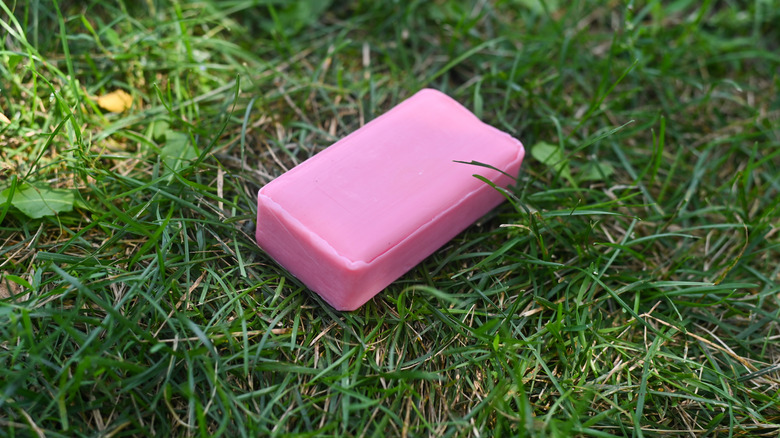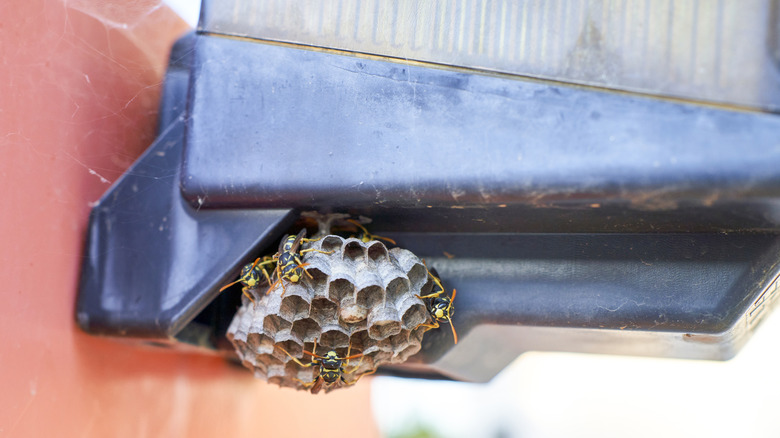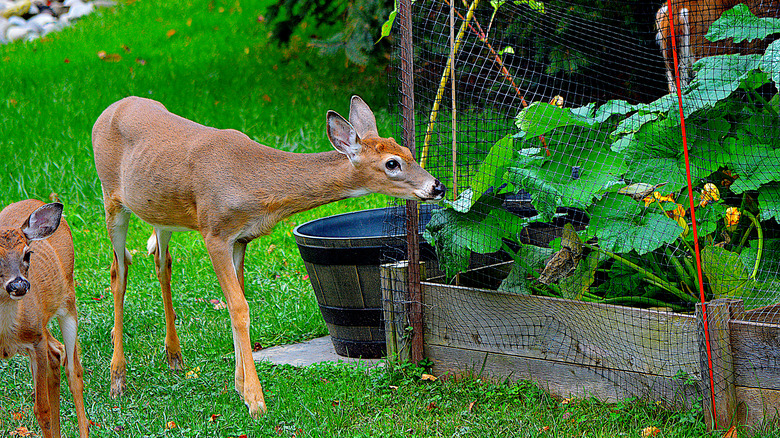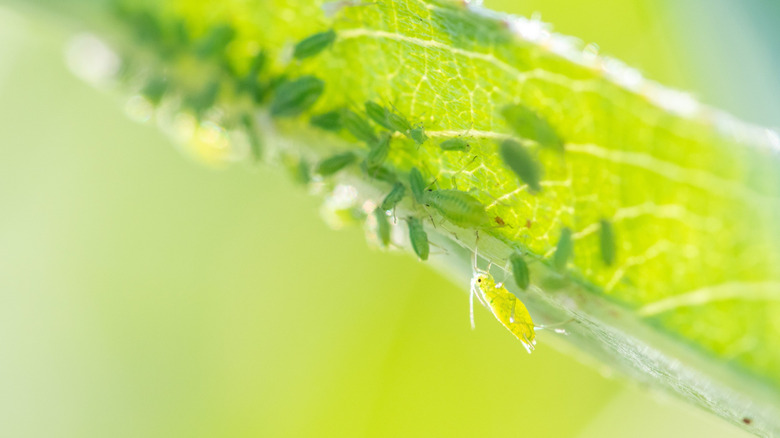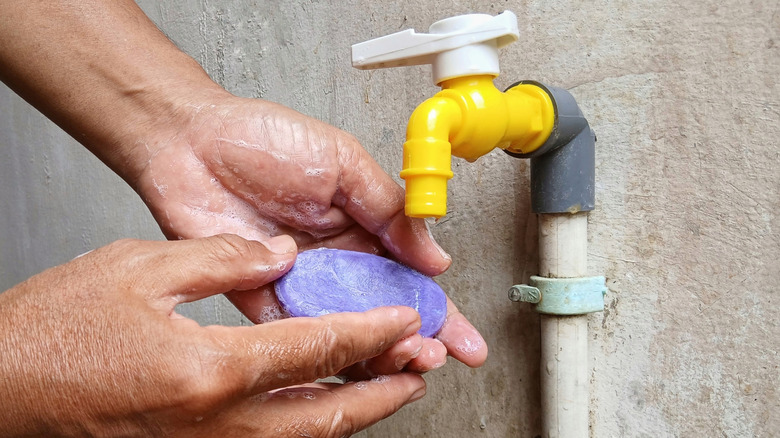All The Benefits Of Putting A Budget-Friendly Bar Of Soap In The Garden
We may receive a commission on purchases made from links.
One of the beauties of gardening is that it doesn't have to be pretentious, complicated, or spendy to be successful. Oftentimes, what you need is already sitting in your home or can be cheaply and easily purchased. You can use orange peels to keep mosquitoes out of your yard, pool noodles as a bumper around your plant containers, or cotton swabs to aid in pollination.
If you have an abundance of bar soap in your house, you're in luck. In addition to using soap to keep your hands clean after working in the yard, we offer additional budget-friendly uses for this common household item in the garden — namely keeping unwanted pests and animals away. The main benefit of these hacks is that you aren't introducing potentially harmful chemicals to your yard. And when you're done, your hands will already be smelling fresh after working with soap ... and cleanup will be a cinch.
Keep wasps out of bird nest boxes
You've worked hard to attract birds to a birdhouse in your yard, only to discover that the avian visitors aren't the only ones on the market for a new home. You might find wasps moving into the nest box, but thankfully, they usually do so only when the box isn't already occupied. Likely, birds haven't moved in yet, or they may be in between breeding seasons.
If the nest box is empty, take preventative action to keep wasps away with a quick and simple trick. Use bar soap to coat the underside of the roof, since the ideal nesting spot for a wasp is under a horizontal surface. You could also extend the coating a few inches down along the walls for extra coverage. Wasp nests, made from wood pulp and saliva, have a paper-like consistency, which doesn't stick well to slick surface coated with soap.
Release a scent that deters deer
In the wild, deer are graceful, majestic, and even mysterious because of their elusiveness. But seeing them in our yards is a different story. We want to deter them from budding flowers, or keep them away from our vegetable gardens. If you've spotted white-tailed deer in your yard (which actually has become more common in many neighborhoods) try combatting these intruders with a bar of soap.
Although this seems like an odd choice of a repellent, it actually makes sense when we consider a deer's keen sense of smell — the strongest of its senses. The white-tailed deer has about 297 million olfactory receptors, which are neurons that detect and recognize different smells. That said, the intense odor of bar soap can turn off a deer and drive it to look elsewhere for food.
To use bar soap as a deer deterrent, hang a bar of fragrant soap every 3 feet, either on trees or shrubs. You can drill a hole through the soap and tie a string through it, or hang the soap in a mesh bag if you don't want the mess of drilling through soap. Since the scent of the soap can fade over time, replace it every month. For best results (especially if you've noticed deer nibbling on the soap), consider trying a new scent each time, since deer can grow accustomed to a particular fragrance.
Make insecticidal soap
If your plants have ever been overrun with pests, you've probably heard of or have used insecticidal soap as a solution. Insecticidal soap is a spray that essentially smothers soft-bodied insects like aphids, mealybugs, whiteflies, and thrips. The product is generally safe for plants, although stronger concentrations can do damage.
People who enjoy the experimental aspect of gardening might want to try their hand at making their own DIY insecticidal soap spray, but you can't use just any soap. Many recipes for DIY sprays call for harsh soaps or dish detergents to either kill the insects or to be used as a sticking and spreading agent for herbicide. However, these ingredients can actually damage plants by stripping off the waxy protective surface of their leaves. DIYers, don't give up just yet.
To make your own insecticide, castile soap — made from vegetable oil instead of animal fat — can be a safe, gentle option for your plants. First, melt down the soap (Kirk's castile bar soap works well for this purpose), following a ratio of 1 tablespoon of soap for 1 quart of water. Cut the soap into chunks about the size of sugar cubes and put them in a microwave-safe container. Heat the soap for 15 to 20 seconds at a time, checking it after each round. Stir gently to help break up any unmelted chunks. Once the soap has melted, mix it well with water and pour the solution into a spray bottle. Test it on a small spot before spraying it on the rest of the plant.
Wash hands easily
To be an effective gardener — whether you're pulling weeds, transplanting shrubs, or putting seeds or starts into the soil — dirtying your hands is inevitable. But this also makes cleaning up a bit more time-consuming. Thankfully, you could start keeping your hands clean even before you start gardening.
Before putting on a pair of gardening gloves, scratch a dry bar of soap with your fingers. Doing so will lodge bits of the soap beneath your fingernails, which doesn't leave room for dirt. The soap is easy to wash off afterward, leaving you with clean fingernails that didn't require scraping out dirt. Just as you can use essential oils as a pesticide in your garden, soaps with scents like lemongrass or lemon balm may serve as double duty to keep you safe from mosquitoes.
Now for the rest of your hands. To avoid going inside the house (and likely dirtying doorknobs or spreading chemicals in the process) simply leave a bar of soap outside. Drill a hole through a bar of soap to hang on the spigot outside or keep soap on a dish on your potting bench to grab when you're ready to wash up.
